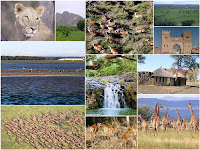Save The Mau Forest!
 Will the Mau Forest be saved? Kenyan leaders and politicians, in a bid for votes, have always failed in reaching an agreement on the Forest; most have always put their political interests first, than the Forests. And that's what they continue to do now.
Will the Mau Forest be saved? Kenyan leaders and politicians, in a bid for votes, have always failed in reaching an agreement on the Forest; most have always put their political interests first, than the Forests. And that's what they continue to do now.They do this, while an environmental disaster lies in waiting. "Effort should be made to save the forest because it is the source of lakes and rivers. Scientific reports say Lake Nakuru will be the first to dry," recently said the Prime Minister, Raila Odinga. Most Kenyan leaders and politicians know the dangers of not protecting the Mau Forest; but fearing in losing votes, they have always failed to act to save the Forest.
"Forest destruction will be a major blow to Kenya's biological diversity, since forests harbor 50% of Kenya's plant species, 40% of mammal species, 35% of butterfly species and 30% of bird species - all on only two percent of the land mass.
Logging in the Mau Forest will have a devastating impact on water quality and level in Lake Nakuru, home to the world's largest concentration of flamingoes. Protected under international law (Ramsar Convention), Lake Nakuru may lose its economic value as Kenya's second most visited tourist site." GlobalResponse
And the downside, as stated by UNEP, could be worse: "Kenya stands to lose a nature-based economic asset worth over US $300 million alone to the tea, tourism and energy sectors if the forest of the Mau Complex continues to be degraded and destroyed, the UN Environment Programme said today".
Isn't it about time for real action? It could be already too late; but better late, than wait for the disaster that would be.


